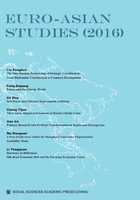
Soft Power and National Rejuvenation of Russia
Abstract: Russia's academia and political circles have gradually enhanced their understanding of soft power. The process from civil diplomacy, public diplomacy, and national image building to soft power development is a requirement of the era and the changing international environment as well as a demonstration of Moscow's increasingly mature concept of state governance. The Kremlin views soft power as a tool to gain its national interests and therefore its relevant strategy underlines a defensive posture, in an attempt to remove the Western world's misgivings and eliminate unfavorable public opinion in the international community. Nonetheless, Russia, a country habituated to using force to resolve international conflicts and hotspot issues, lags far behind the West in adopting soft power.
Keywords: Russia, soft power, political communication
On February 12, 2013, the Kremlin issued the Foreign Policy Concept of the Russian Federation of 2013. It points out clearly, “‘Soft power'… is becoming an indispensable component of modern international relations, ” and Russia should improve “the application of ‘soft power' and identifying the best forms of activities in this area that would take into account both international experience and national characteristics.” It was the first time the Russian government used the term “soft power” in its official document, reflecting its determination to win the global competition with both its traditional hard power and its growing soft power. Since the publication of the new edition of the Concept, the Edward Snowden incident, the Syrian crisis and the Sochi Winter Olympics, Russia has been pushed to the center of the international stage. But Moscow has fully manifested its demeanor as a great nation by appropriately addressing these conundrums. However, the Ukrainian crisis that erupted at the end of the 2013 destroyed the country's favorable image which it had shaped for a decade. Its vision to integrate in the Western civilization and establish a true strategic partnership with the North Atlantic Treaty Organization (NATO)
It was the first time the Russian government used the term “soft power” in its official document, reflecting its determination to win the global competition with both its traditional hard power and its growing soft power. Since the publication of the new edition of the Concept, the Edward Snowden incident, the Syrian crisis and the Sochi Winter Olympics, Russia has been pushed to the center of the international stage. But Moscow has fully manifested its demeanor as a great nation by appropriately addressing these conundrums. However, the Ukrainian crisis that erupted at the end of the 2013 destroyed the country's favorable image which it had shaped for a decade. Its vision to integrate in the Western civilization and establish a true strategic partnership with the North Atlantic Treaty Organization (NATO) was declared broken and the soft power strategy proposed in the Concept was confronted with severe challenges.
was declared broken and the soft power strategy proposed in the Concept was confronted with severe challenges.